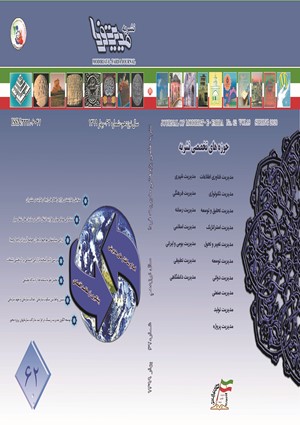نقشهای کارآفرینان فناور در اکوسیستم کارآفرینی فناورانه
الموضوعات : مدیریت تکنولوژیامیرمهدی میثمی 1 , قنبر محمّدی الیاسی 2 , سید رضا حجازی 3 , علي مبيني دهكردي 4
1 - دانشگاه تهران
2 - دانشگاه تهران
3 - دانشگاه صنعتی شریف
4 - دانشگاه تهران
الکلمات المفتاحية: اکوسیستم کارآفرینی کارآفرینی فناورانه نقشهای کارآفرینان فناور روش داده بنیاد,
ملخص المقالة :
اکوسیستم کارآفرینی فناورانه شامل اجزاء و روابط مختلف و پیچیدهای است که همگی در جهت بروز و رشد کارآفرینی فناورانه در تعامل و ایفای نقش میباشند. محور اصلی این اکوسیستم فرد کارآفرین فناور بوده که علاوه بر برخورداری از ویژگیهای خاص، میبایست اقدامات مشخصی را در اکوسیستم به انجام رساند. علیرغم اهمیت فرد کارآفرین (فناور) در اکوسیستم کارآفرینی (فناورانه)، تاکنون متون و تحقیقات مرتبط به طور جامع و دقیقی به بررسی و تبیین نقشهای آنها در اکوسیستم نپرداخته است. پژوهش کیفی جاری در تلاش است تا با اتخاذ رویکرد ساختگرایی داده بنیاد، بهرهگیری از مصاحبههای عمیق و همچنین دادههای معتبر ثانویه نسبت به شناسایی و تبیین نقشهای کارآفرینان فناور در اکوسیستم کارآفرینی فناورانه اقدام نماید. در این مطالعه 27 مسیر شکلگیری و توسعه کسب و کار فناورانه مورد بررسی و تحلیل عمیق قرار گرفته که منجر به 14 نقش در قالب سه گروه گردیده است. اول، گروه نقشهای اصلی شامل مطالعه و تحقیق و توسعه، شناخت و تحلیل بازار و تجهیز منابع. دوم، گروه نقشهای پشتیبان نظیر شبکهسازی و تعاملات، رصد رخدادها و همکاری با افراد تخصصی دیگر. سوم، گروه نقشهای زمینهای (عام) مانند اعتمادسازی و تعامل با دیگر اجزاء اکوسیستم. این مجموعه نقشها که حسب ماهیت خود در تعامل و ارتباط با دیگر اجزاء اکوسیستم هستند به تعمیق ادبیات حوزه اکوسیستم کارآفرینی (فناورانه) کمک نموده و همچنین میتواند مبنایی اثربخش در جهت هدایت اقدامات کارآفرینان فناور به حساب آید.
میثمی، ا. م.، محمدی الیاسی، ق.، مبینی دهکردی، ع.، و حجازی، س. ر. (1397). ابعاد و مولفههای اکوسیستم کارآفرینی فناورانه در ایران. فصلنامه مدیریت توسعه فناوری، 5(3)، 9–42.
Boutillier, S., Carré, D., & Levratto, N. (2016). Entrepreneurial Ecosystems (1st ed.). Hoboken, NJ, USA: John Wiley & Sons, Inc. https://doi.org/10.1002/9781119285175
Charmaz, K. (2006). Constructing Grounded Theory. London: SAGE Publications.
Creswell, J. W. (2012). Educational research: Planning, conducting, and evaluating quantitative and qualitative research (4th edition). Boston: Pearson Education.
Cross Border Virtual Incubator. (2013). Optimising the entrepreneurship ecosystem. Retrieved from https://eadtu.eu/images/publicaties/CBVI-Optimising_the_entrepreneurship_ecosystem.pdf
Feld, B. (2012). Startup communities: Building an Entrepreneurial Ecosystem in Your City. (B. Feld, Ed.). Hoboken, NJ, USA: John Wiley & Sons, Inc. https://doi.org/10.1002/9781119204459
Glaser, B., & Strauss, A. (1967). The discovery of grounded theory: strategies for qualitative research. London: Weidenfeld and Nicolson.
Gupta, R., Jain, K., Kusre, A., & Momaya, K. S. (2015). Technology Entrepreneurship Ecosystem in India : Findings from a Survey. Retrieved from https://www.pomsmeetings.org/confpapers/060/060-1492.pdf
Hoda, R., Noble, J., & Marshall, S. (2010). Using grounded theory to study the human aspects of software engineering. In Human Aspects of Software Engineering on - HAoSE ’10 (p. 1). New York, New York, USA: ACM Press. https://doi.org/10.1145/1938595.1938605
Hwang, W., & Horowitt, G. (2012). The Rainforest: the secret to building the next silicon valley. Los Altos Hills: Regenwald.
Isenberg, D. J. (2010). How To Start an Entrepreneurial Revolution. Harvard Business Review, (June), 12.
Isenberg, D. J. (2011). The Entrepreneurship Ecosystem Strategy as a New Paradigm for Economic Policy: Principles for Cultivating Entrepreneurships. The Babson Entrepreneurship Ecosystem Project. Retrieved from http://www.innovationamerica.us/images/stories/2011/The-entrepreneurship-ecosystem-strategy-for-economic-growth-policy-20110620183915.pdf
Kenny, M., & Fourie, R. (2015). The Qualitative Report Contrasting Classic, Straussian, and Constructivist Grounded Theory: Methodological and Philosophical Conflicts. The Qualitative Report, 20(8), 1270–1289.
Lee, S. (2010). Technology Entrepreneurship for Emerging Markets – An Ecosystem Approach. Retrieved from http://www.innovationmanagement.se/2010/12/13/technology-entrepreneurship-for-emerging-markets-an-ecosystem-approach/
Lincoln, Y. S., & Guba, E. G. (1985). Naturalistic inquiry. (E. G. Guba & SAGE Publishing, Eds.). Sage Publications.
Malecki, E. J. (2018). Entrepreneurship and entrepreneurial ecosystems. Geography Compass, 12(3), 1–21. https://doi.org/10.1111/gec3.12359
Mason, C., & Brown, R. (2014). Entrepreneurial Ecosystems and Growth Oriented Entrepreneurship. Oecd. Retrieved from https://www.oecd.org/cfe/leed/Entrepreneurial-ecosystems.pdf
Nacu, C. M., & Avasilcăi, S. (2014). Environmental Factors Influencing Technological Entrepreneurship: Research Framework and Results. Procedia - Social and Behavioral Sciences, 109, 1309–1315. https://doi.org/10.1016/j.sbspro.2013.12.630
Parry, K. W. (1998). Grounded theory and social process: A new direction for leadership research. The Leadership Quarterly, 9(1), 85–105. https://doi.org/10.1016/S1048-9843(98)90043-1
Prodan, I. (2007). A model of technological entrepreneurship. In F. Thérin (Ed.), Handbook of Research on Techno-Entrepreneurship (pp. 26–39). Cheltenham, UK • Northampton, MA, USA: Edward Elgar Publishing.
Rabelo, R. J., & Bernus, P. (2015). A holistic model of building innovation ecosystems. IFAC-PapersOnLine, 28(3), 2250–2257. https://doi.org/10.1016/j.ifacol.2015.06.423
Roja, A. (2015). Technology Entrepreneurial Ecosystems and Entrepreneurship in the West Region of Romania. Studia Universitatis Economics Series, 25(1), 40–59. https://doi.org/10.1515/sues-2015-0004
Saunders, M., Lewis, P., & Thornhill, A. (2016). Research Methods for Business Students (Seventh ed). Pearson Education Limited.
Spigel, B. (2017). The Relational Organization of Entrepreneurial Ecosystems. Entrepreneurship Theory and Practice, 41(1), 49–72. https://doi.org/10.1111/etap.12167
Stam, E. (2015). Entrepreneurial Ecosystems and Regional Policy: A Sympathetic Critique. European Planning Studies, 23(9), 1759–1769. https://doi.org/10.1080/09654313.2015.1061484
Suresh, J., & Ramraj, R. (2012). Entrepreneurial Ecosystem : Case Study on the Influence of Environmental Factors on Entrepreneurial Success. European Journal of Business and Management, 4(16), 95–102.
Tansley, A. G. (1935). The Use and Abuse of Vegetational Concepts and Terms. Ecology, 16(3), 284–307. https://doi.org/10.2307/1930070
Valdez, J. (1988). The entrepreneurial ecosystem: Toward a theory of new firm formation.
Willig, C. (2013). Introducing Qualitative Research in Psychology. Open University Press.
World Economic Forum. (2014). Entrepreneurial Ecosystems Around the Globe and Early-Stage Company Growth Dynamics. Geneva.


